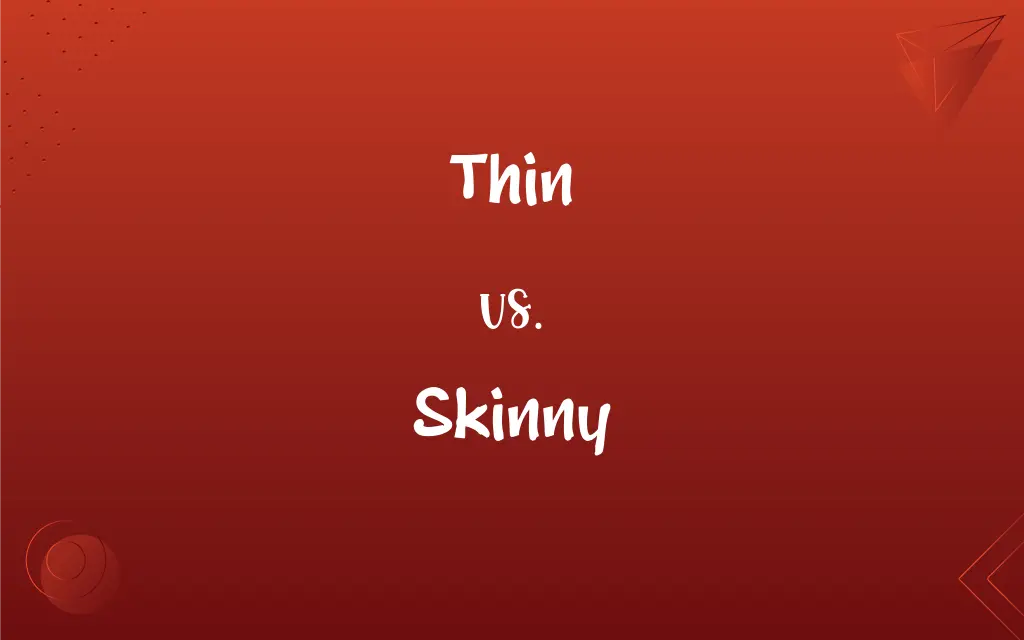Thin vs. Skinny: What's the Difference?
Edited by Janet White || By Harlon Moss || Updated on October 25, 2023
Both describe a lack of thickness or fat, but "thin" often refers to an object or layer's slimness, while "skinny" typically implies an underweight or extremely slender person or animal.

Key Differences
The word "thin" is a versatile adjective that can describe anything from paper to fabric, highlighting its lack of thickness or breadth. "Skinny," on the other hand, is frequently used to describe people or animals, suggesting they are notably slender, often more than what might be considered normal or healthy.
While "thin" can have neutral, positive, or negative connotations depending on the context, "skinny" sometimes carries a more negative undertone, implying a lack of muscle or substance. For example, describing a person as "too skinny" often indicates concern for their health.
In various contexts, "thin" might refer to an object's form or a situation's probability. For instance, "a thin chance" implies low likelihood. "Skinny," however, when not referring to physique, might denote inside information, as in "the skinny on the situation."
When used in the fashion industry, "thin" might relate to the material or the design, whereas "skinny" often designates a specific style or fit, like "skinny jeans."
Both "thin" and "skinny" can relate to food and diets. A "thin slice" of pizza suggests a slim piece, while "skinny latte" usually means it's made with non-fat or low-fat milk. Yet, if someone is on a "skinny diet," it typically indicates a regimen aimed at losing weight.
ADVERTISEMENT
Comparison Chart
Primary Usage
Refers to slimness or slightness in objects.
Typically refers to slender people or animals.
Connotations
Neutral, can be positive or negative.
Often negative, implying underweight or lacking muscle.
Contextual Usage
"Thin chance," "thin layer."
"Skinny jeans," "the skinny on the situation."
Related to Fashion
Material or design.
Specific style or fit.
Associated with Food
Size or consistency, like "thin crust."
Dietary choices, like "skinny latte."
ADVERTISEMENT
Thin and Skinny Definitions
Thin
Slight in form or build.
She had a thin face with sharp features.
Skinny
Lacking sufficient flesh or muscle.
He's been looking too skinny since he started that new diet.
Thin
Not dense or plentiful.
His hair was thinning with age.
Skinny
Very lean or thin.
The cat looked skinny after being lost for weeks.
Thin
Lacking in richness or force.
The soup had a thin taste, needing more seasoning.
Skinny
Containing fewer calories or fat.
I'll have the skinny vanilla latte, please.
Thin
Lacking thickness or bulk.
The thin fabric was almost transparent.
Skinny
Inside information.
Give me the skinny on the new project.
Thin
Not dense in arrangement or distribution.
The crowd was thin after the rain started.
Skinny
Narrow or slender.
She bought a pair of skinny heels for the party.
Thin
Relatively small in extent from one surface to the opposite, usually in the smallest solid dimension
A thin book.
Skinny
Having very little bodily flesh or fat, often unattractively so; very thin.
FAQs
Does "thin" always have a negative connotation?
No, "thin" can be neutral, positive, or negative depending on the context.
Is "skinny" usually used for people?
Yes, "skinny" often describes a very slender person or animal.
How does "thin ice" relate to danger?
"On thin ice" means in a risky or precarious situation.
Can "thin" describe facial features?
Yes, like "thin lips" or "a thin nose."
Can a drink be "skinny"?
Yes, like a "skinny margarita" with fewer calories.
Can "thin" describe probability?
Yes, "a thin chance" means a low likelihood.
Can "thin" describe a consistency?
Yes, like "thin batter" or "thin sauce."
Can a sound be described as "thin"?
Yes, a "thin" sound might lack depth or resonance.
Can "skinny" describe a type of food?
Yes, typically indicating a lower-calorie or healthier version.
Can "skinny" refer to information?
Yes, "the skinny on something" means inside or detailed information.
Is "skinny latte" related to body weight?
No, it usually means a latte made with non-fat or low-fat milk.
Is "skinny" always negative when describing a person?
Not always, but it can imply being underweight or lacking muscle.
Can "skinny" mean narrow?
Yes, "skinny" can describe something narrow or slender.
Is "skinny dipping" about weight?
No, it refers to swimming without any clothes on.
Can "thin" describe a crowd?
Yes, a "thin crowd" suggests not many attendees.
Is "skinny" used in fashion?
Yes, like "skinny ties" or "skinny belts."
Can "thin" describe objects other than people?
Yes, "thin" can describe anything lacking thickness, like paper or fabric.
What might "thin soup" imply?
"Thin soup" might suggest it's watery or lacking richness.
Does "thin air" refer to altitude?
Not necessarily. "Out of thin air" means appearing suddenly without explanation.
What does "skinny jeans" mean?
"Skinny jeans" are a style of tight-fitting jeans.
About Author
Written by
Harlon MossHarlon is a seasoned quality moderator and accomplished content writer for Difference Wiki. An alumnus of the prestigious University of California, he earned his degree in Computer Science. Leveraging his academic background, Harlon brings a meticulous and informed perspective to his work, ensuring content accuracy and excellence.
Edited by
Janet WhiteJanet White has been an esteemed writer and blogger for Difference Wiki. Holding a Master's degree in Science and Medical Journalism from the prestigious Boston University, she has consistently demonstrated her expertise and passion for her field. When she's not immersed in her work, Janet relishes her time exercising, delving into a good book, and cherishing moments with friends and family.































































